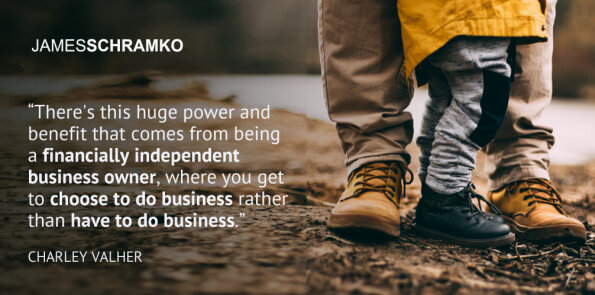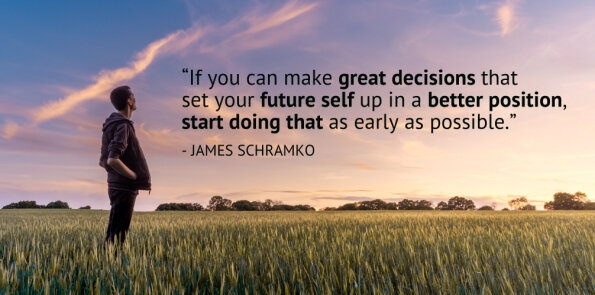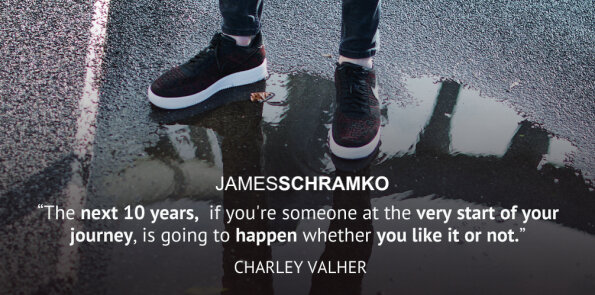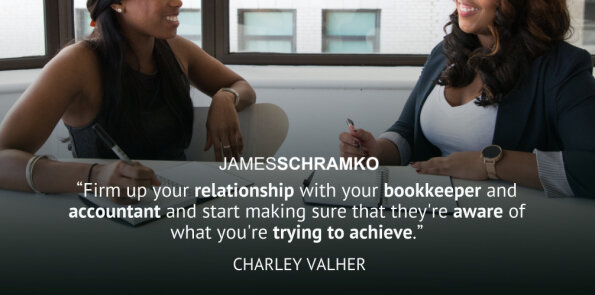Podcast: Download (Duration: 41:24 — 41.7MB)
Get Notified Of Future Episodes Apple Podcasts | Spotify | Amazon Music | Android | Blubrry | Gaana | TuneIn | Deezer | Anghami | RSS | More
Disclaimer: Neither Charley nor James are offering financial advice. This is a discussion and opinion only. Please consult a professional financial advisor for your own situation.
Editing note: Charley’s site is now Business & Investing
Charley Valher can’t say enough about the benefits of financial independence. And he’s eager to help business owners enjoy the same great life he does.
In this, Charley’s latest appearance on the show, he and James put forward some compelling reasons for becoming financially independent (in case you’re still not convinced it’s a good thing).
They talk about the 10-year timeframe, in which a whole lot of change can happen if you take it upon yourself to act.
And you’ll hear how important responsibility is in wealth building, as is making decisions for your future self.
Table of contents
1. What being financially independent means
2. Cost cutting and compromise
3. What 10 years can do
4. The contrast of then and now
5. Avoiding the wrong kind of customer
6. Setting your future self up for a great life
7. The role of kids and responsibility
8. Financial independence and your health
9. A lesson in resilience from the ocean
10. When you can get the 10 years in early…
11. The actionable takeaways
What being financially independent means
In terms of financial independence, says Charley, there are three categories:
1. If you’re living week to week or month to month, you’re not financially independent.
2. Then there’s a middle category of people who maybe have good buffers, perhaps a few investments, but still need to do work and business to keep the machine going.
3. The third category is what you want to aim for, and this where you don’t have to work or run a business at all, ever. Your assets and investments will look after you for the rest of your life. This is financial independence.
Charley is fortunate to be in the third category. If he doesn’t want to, he doesn’t need to work.
There’s this huge power and benefit that comes from being a financially independent business owner, where you get to choose to do business rather than have to do business.
Charley, personally, loves the game and doesn’t think he’ll ever stop. But it’s much more enjoyable and fun when you’re not doing it out of necessity and urgency.
Cost cutting and compromise
Charley has a friend whose business has one big client. That client is now making threats of leaving, and it’s pushed this friend into a world of stress.
Another friend has bought a house that, in Charley’s opinion, is much too big for him, in financial terms – two or three million dollars. This friend doesn’t necessarily have a business that can support that type of mortgage, and his plan is to enter full hustle mode to pay it off, regardless that he has kids and will need to work extreme hours.
The word that comes to mind there, says James, is compromise.
When James had a job he was conscious of being single-source dependent, with no confidence that the relationship with his employer was sustainable. He went into business to escape that, to not have to compromise.
Now some people, says Charley, choose to achieve financial independence through extreme cost-cutting. He is actually a member of the FIRE movement, a group of people looking to retire early through savings and investment.
James knows lots of expats who live overseas, where the cost of living is much less. For him, it’s too much of a compromise.
He thinks some people, by focusing overly much on how to reduce expenses, actually lower their ability to create income to match their cost of living, rather than speed up their financial independence or have the option to live as he and Charley, for instance, live.
What 10 years can do
Charley wears what he like, eats well, and lives in a nice area. And it wasn’t always like that – like James, he went through a phase of grinding and pressure to earn, to support his family.
He hopes this can inspire people with the idea that change is possible.
James proposes a timeline of 10 years. In 10 years, you can change just about every single aspect of your life.
It sounds long for some, but in his lifetime he’s passed five lots of 10 years, so he knows it’s achievable for most. In 10 years, you could change your business and the clients you deal with; your kids obviously change in 10 years; where you live, who you associate with, what hobbies and sports you do all could change.
Accept change, embrace change, celebrate change, master change, says James, and your next 10 years could be as radical as you want it to be.
The contrast of then and now
Charley shares one of the differences between his previous life and today.
Before, when there were bills to pay, there was no saying no to work or clients. They had to take on projects or work with certain people, because it was a requirement of making payroll, or keeping the lights on.
They would take on clients they shouldn’t, who would churn or leave, or ask them to do things out of scope, which lead to stress and longer hours.
Now Charley says no to things that aren’t the right fit, or to people he doesn’t want to work with, or to projects he doesn’t want. And that alone makes a huge impact on his general enjoyment of business and life, because there’s less of doing things purely for short-term money focus and more of playing a longer, bigger game in business.
Avoiding the wrong kind of customer
You should, as soon as possible, says James, avoid at all costs dealing with the wrong type of client, because they perpetuate drama. He talked about that in Episode 959 with another guest.
One of James’s mentors taught him, An empty flat is better than a bad tenant. So get to that position where you have the choice to say no, and life is going to be much easier for you.
Setting your future self up for a great life
Back then, when James would say yes to speaking at an event, he knew as the date neared that he’d have to pack, go to the airport, get on the plane and be away from his family for a week.
He’d then look at his past self and ask, Why did you do this to me? This is one of the key points of this episode, he says, the idea that you can look after your future self by making better decisions today.
If you can make great decisions that set your future self up in a better position, says James, start doing that as early as possible. That’s why the now version of his life is better than previous versions, because it’s been a working process over time to refine his filters and adjust his decision-making process, using hindsight to inform future decisions.
Having and growing a business, for instance, is a great step to financial independence. There’s infinite upside to having a business, whereas in a job you can only ever cut cost 100 percent.
And do not expect you’ll win the lottery or receive an inheritance. Some people pin hopes on that scant possibility, and even if it should happen, in James’s opinion, they’re not likely to hang on to the money.
The role of kids and responsibility
A lot of people miss one trait that James thinks is closely linked to having family – responsibility.
The person waiting for an inheritance generally lacks responsibility. They’ve abdicated agency in their finances and are looking for a handout, which is unfortunate.
Having a child at a young age forced responsibility onto James. And while he does not recommend it, he does believe he would not have had the persistence he had to succeed otherwise.
Perhaps Charley’s friend with the pricey house is looking for the same kind of motivation, he says, but because of it he may not be present for his children.
Financial independence and your health
Charley wants to jump onto another point, health.
A friend, Grant, recently told him, You’re not the same person.
Grant was a friend of many, many years, so he knew Charley well. There was a very distinct difference in Charley’s health, he said, and just presence with people in general.
Charley used to be very short and direct with people, said Grant, like he was always too busy. That type of behavior, over a long period of time, wasn’t healthy, psychologically or physically.
Stress and declining health are not something you want to bring to business, says Charley, not when business requires so much thought. And the tendency when one is not financially comfortable is to neglect one’s health, the consequences of which can be huge.
Charley has seen a similar change in James from when he was working longer hours, under more pressure, to today. He’s more relaxed now, especially since he took up surfing.
Years ago, says James, he was in survival mode, living on three or four hours of sleep, not fit or healthy or happy. He’s made it through the tunnel to the light and will never go back.
Health-wise, he now has the lowest resting pulse he’s ever had. He’s twice the age he was in the dealership, and twice as fit – stronger, fitter, mentally more acute.
And he’s extremely relaxed and hard to rile. He’s not as competitive, not seeking acknowledgement or external significance.
A lesson in resilience from the ocean
James’s hope is that people listening who are dissatisfied with life will know change is possible. It won’t be easy – hits are part of life – but he’s learned something of resilience.
The other day he paddled under a head-high wave, which crashed on top of him. It knocked his board out and held him down – like getting tackled by six people.
It tumbled him like a washing machine; he couldn’t see the surface. Resisting panic, James relied on his training, held his breath, and waited.
The wave finally released him, and he came to the surface. And to come out of that, of what seems like impending doom, he says, makes you realize, we’re much more capable than we take credit for.
We have a lot of reserve. We can learn things.
When you can get the 10 years in early…
Does James attract better people into his life and better scenarios because he’s more calm and centered and relaxed and fit and healthy? He believes so.
And he takes responsibility for himself, because that’s one thing he has control of – how he moves, what he eats, who he associates with, what he thinks, how he uses media, etc.
He make choices the best way he can. And when he doesn’t get it right, he learns from it and inputs new data into his filter process.
And for what it’s worth, he does think Charley has changed in the short time that he’s known him. He’s in the groove, and it’s awesome to see.
That’s what Charley would like to pass on, that the journey to reach financial independence is a worthy pursuit. The time is going to pass anyway – the next 10 years, if you’re someone at the very start of your journey, is going to happen whether you like it or not.
And Charley is a relatively young man, says James. the success he’s had for his age is significant.
Men in their mid-20s through to mid-30s is James’s sweet spot in terms of impact. Ezra Firestone, Ryan Levesque, and Pat Flynn come to mind. They’ve achieved great success within the span of a decade.
The actionable takeaways
It would be a terrible episode, says Charley, if all they did was sell the benefits.
No, they’ve given some practical points, James says:
1. Ten years is a realistic timeframe to achieve complete transformation.
2. Reduce and eliminate compromise at every possible opportunity.
3. Do things today that will put your future self in a better position, in particular as regards health, fitness, finances and relationships.
4. Make better decisions and improve your decision-making filters as you progress. Get the benefit of hindsight from decisions you’ve already made.
5. Take responsibility. Have a great life, regardless of whether you do or don’t get an inheritance or win the lottery.
Charley would like to throw in something more.
Awareness is huge – we get so busy running our business that we forget about the money side of things. He encourages business owners to listen to the Business & Investing podcast and gain focus on the wealth journey.
And get the emails, says James. They’re really good food for thought.
And secondly, says Charley, financial skills are critical to building wealth. He suggests you firm up your relationship with your bookkeeper and accountant and start making sure that they’re aware of what you’re trying to achieve.
They’re actually in the process of building a bookkeeping service that’s focused on helping business owners fulfill the financial independence and wealth component.
So not just saying, Here’s how your business did this month, but, Hey, here’s how your business did this month, and here’s how you’re progressing towards your own wealth journey.
James is glad to hear that. He likes also what Charley is doing with his Business & Investing community, creating a place where people share their journeys and their wins and how they’re implementing what Charley teaches.
If you have topic suggestions, or you want to hear about something specifically from Charley, reply to any of James’s emails.
Be one of the fulfilled business owners inside the James Schramko membership
Liked the show? Enjoy all the episodes when you subscribe on iTunes













Leave a Reply